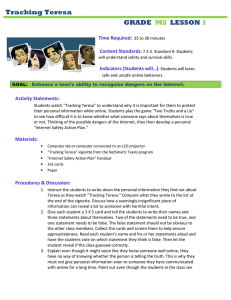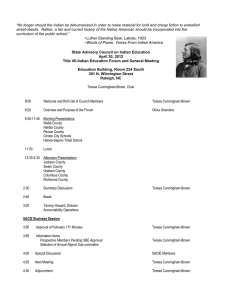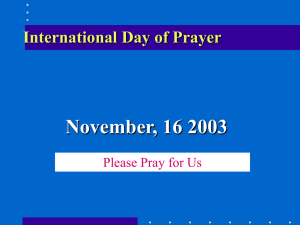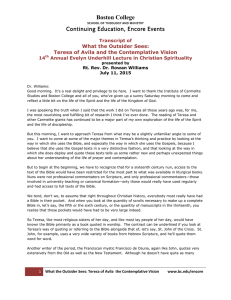In today’s gospel, Jesus tells us the story of two... temple to pray. The first man, a Pharisee, uses his...
advertisement
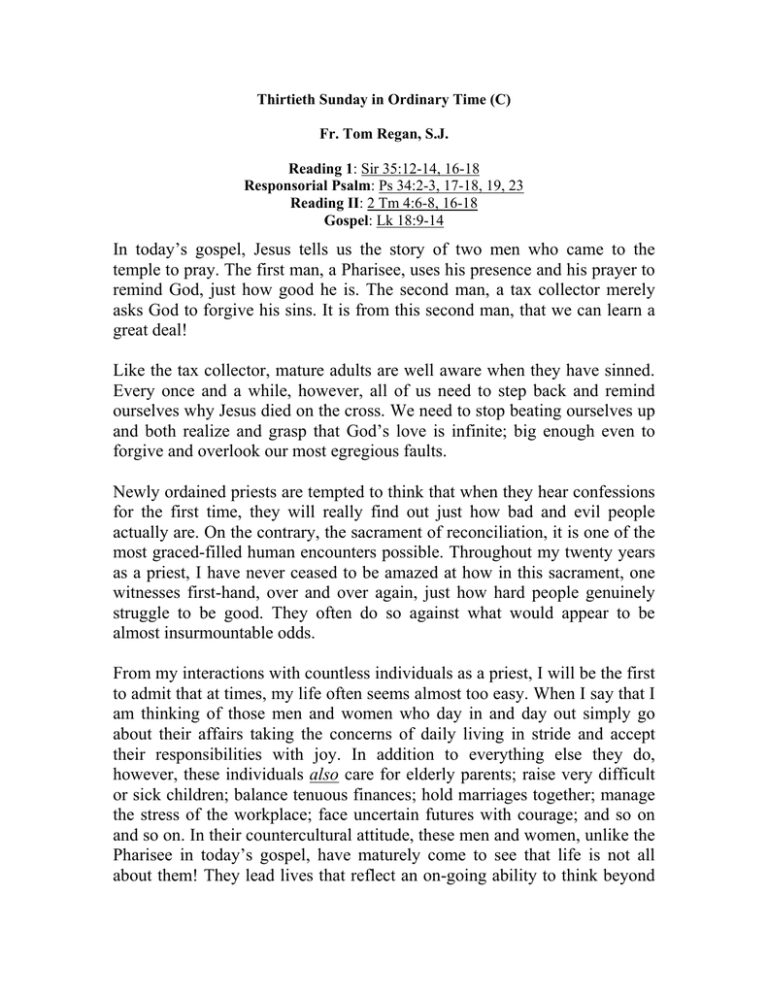
Thirtieth Sunday in Ordinary Time (C) Fr. Tom Regan, S.J. Reading 1: Sir 35:12-14, 16-18 Responsorial Psalm: Ps 34:2-3, 17-18, 19, 23 Reading II: 2 Tm 4:6-8, 16-18 Gospel: Lk 18:9-14 In today’s gospel, Jesus tells us the story of two men who came to the temple to pray. The first man, a Pharisee, uses his presence and his prayer to remind God, just how good he is. The second man, a tax collector merely asks God to forgive his sins. It is from this second man, that we can learn a great deal! Like the tax collector, mature adults are well aware when they have sinned. Every once and a while, however, all of us need to step back and remind ourselves why Jesus died on the cross. We need to stop beating ourselves up and both realize and grasp that God’s love is infinite; big enough even to forgive and overlook our most egregious faults. Newly ordained priests are tempted to think that when they hear confessions for the first time, they will really find out just how bad and evil people actually are. On the contrary, the sacrament of reconciliation, it is one of the most graced-filled human encounters possible. Throughout my twenty years as a priest, I have never ceased to be amazed at how in this sacrament, one witnesses first-hand, over and over again, just how hard people genuinely struggle to be good. They often do so against what would appear to be almost insurmountable odds. From my interactions with countless individuals as a priest, I will be the first to admit that at times, my life often seems almost too easy. When I say that I am thinking of those men and women who day in and day out simply go about their affairs taking the concerns of daily living in stride and accept their responsibilities with joy. In addition to everything else they do, however, these individuals also care for elderly parents; raise very difficult or sick children; balance tenuous finances; hold marriages together; manage the stress of the workplace; face uncertain futures with courage; and so on and so on. In their countercultural attitude, these men and women, unlike the Pharisee in today’s gospel, have maturely come to see that life is not all about them! They lead lives that reflect an on-going ability to think beyond themselves. It is through their actions that the love of Christ becomes a vibrant reality in the lives of others. Few if any of these selfless individuals would ever think of themselves as saints. Most in fact would probably immediately identify with the tax collector. They too, approach the altar humbly, asking only for God’s forgiveness. Perhaps one of these individuals is sitting next to you. Perhaps you, yourself are of one of these individuals? Recently there has been a considerable reaction in the press to the revelations concerning the inner spiritual life of the late Mother Teresa. This reaction was prompted in part by the publication last month of several of her private letters. Why even a Jesuit from the New England province was asked to comment on the topic by no less than Stephen Colbert! If you didn’t catch this segment on the Colbert report it is worth checking out on the web. 1 After seventeen years of classroom teaching for the Sisters of Loreto, a thirty-six year old Teresa, decided to leave her duties and go to work among the poorest of the poor in the city of Calcutta. In that period of transition, Teresa heard an inner voice telling her, “You are, I know the most incapable person, weak and sinful, but just because you are that – I want to use you for My glory.” In its September 3rd edition, Time magazine published an excerpt from a letter that Mother Teresa wrote to a priest friend and confidant, in which she observed, Jesus has a very special love for you, [But] as for me the silence and the emptiness is so great, that I look and do not see, - Listen and do not hear – the tongue moves [in prayer] but does not speak. I want you to pray for me – that I let Him have [a] free hand. Remember, this is the same woman who won a Nobel Prize for her legendary work among poor. And yet, throughout her years of laboring in the Lord’s vineyard, over forty of her letters reveal that while she was bearing the love of Christ to others, she herself was experiencing “dryness,” “darkness,” and an inner “loneliness.” 1 See: http://www.comedycentral.com/motherload/player.jhtml?ml_video=102804&ml_collection=&ml_gateway =&ml_gateway_id=&ml_comedian=&ml_runtime=&ml_context=show&ml_origin_url=/shows/the_colber t_report/videos/celebrity_interviews/index.jhtml%3FplayVideo%3D102804%26rsspartner%3Drsscurl&ml _playlist=&lnk=&is_large=true 2 Too often, some individuals think that by believing in Christ, they should get a free ride through life. They think that somehow a believer’s life should be one that is spared of the realities of suffering, illness, injustice, doubt and yes even sin. But as life unfolds and wisdom and experience take the place of naïveté and idealism, adult believers see that they are invited and in fact called to experience a deeper sense of what serving the Lord is all about. Like Mother Teresa, so many adult believers regularly encounter feelings of “dryness,” “darkness,” and that sense of inner “loneliness.” Mature women and men realize that such feelings are a normal facet of life. Yet despite these feelings, people of genuine faith never revert to self pity or the type of narcissistic self absorption that appears to characterize the Pharisee’s prayer in today’s gospel. In his letter to Timothy St. Paul encourages us to embrace this very same modality of faith and stay its course of selfless action and fidelity. Of his own life, Paul writes, “Beloved: I am already poured out like a libation, and the time of my departure is at hand. I have competed well; I have finished the race, I have kept the faith.” Today’s readings take adult believers seriously. Life may not be easy, but each and every day it can be experienced persistently and patiently with the reassuring sense that despite the bumps caused by our own selfishness and sinfulness the reality of God’s love is never in question. You and I are placed upon this earth not only to experience the reality of God’s abundant love and forgiveness in our own lives but also to share that reality with one another. In one of his prayers Søren Kierkegaard, the great Danish religious writer and philosopher offers a most appropriate observation with which to conclude these remarks. Perhaps this might have been the tax collector’s prayer; perhaps it might become yours as well? Kierkegaard prays: Father in Heaven! Hold not our sins up against us but hold us up against our sins so that the thought of You when it awakens in our soul, and each time it awakens, should not remind us of what we have committed but of 3 what You have forgiven, not of how we went astray but of how You [love and]save us! AMEN. 2 (Slightly paraphrased) 2 Perry D. LeFevre, The Prayers of Kierkegaard (Chicago: The University of Chicago Press, 1956), p. 15. See also, http://www.thewords.com/articles/soren1.htm (prayer four). 4
